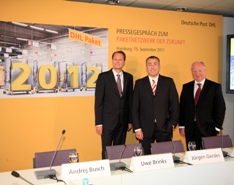Deutsche Post DHL will invest a massive €750 million in expanding its parcels business inGermany to increase capacity and to double volumes over the next decade thanks to dynamic
e-commerce growth.Under the investment, which will run until 2013 or early 2014, DHL Parcel Germany will increasesorting capacity at its 33 parcel centres across the country, reorganise parcel districts to offerlater pick-up times from shippers and give consumers more choice over their deliveries. It aims toimprove the next-day delivery rate from 90% at present to 95% in future.
Jurgen Gerdes, head of Deutsche Post DHL’s mail and parcel division, presenting the new “ParcelConcept 2012” at a press conference in Hamburg, said: “This is the largest investment in our parcelinfrastructure since the 1990s. We are further expanding our leading position in the market makingour parcel business the second strong pillar of our mail business.”
DHL Parcel Germany, which had revenues of €2.7 billion and delivered 1.7 billion parcels lastyear, has about 40% of the €6.8 billion German parcels market. It is the clear B2C market leaderbut second behind DPD in the B2B market, although Gerdes aims to close the gap in this segment.
Since 2007 the parcels operator has increased revenues by 3.5% a year on average but now plansfaster growth. Gerdes expects parcel volumes to double over the next decade from 2.6 millionparcels daily at present but he declined to give a targeted revenue growth rate for the comingyears. “Currently, our growth rate is going far beyond this average with a 9% increase and we hopeto increase our market share,” DHL Parcel Germany CEO Andrej Busch pointed out.
DHL Parcel Germany is focusing heavily on the e-commerce sector for its future growth. Gerdessees big potential in the sector as more and more products are ordered via the internet. Inaddition to the common products ordered online such as books, clothes, shoes and electronics, newsegments including groceries, pharmaceuticals or cosmetics also have a big growth potential fore-commerce, he stressed.
Busch told CEP-Research: “The distance-selling market made up about 8% of the total retailmarket in Germany in 2010. This should double to about 15% in the next 10 years, according toexperts. Personally, I believe it could reach 15%-20%. Therefore the B2C market will also double inthe next decade.”
However, he also stressed that the B2B market is not flat but showing growth. For example,behind a B2C delivery there was often a B2B delivery to the retailer first of all. Busch pointedout that the borders between B2B and B2C parcels were becoming less clear as traditional retailersincreasingly sold online as well.
At present, DHL’s 33 fully automated parcel centres in Germany have capacity to sort 20,000parcels an hour. To further improve the service quality, the capacity of the sorting centres willbe further increased through a considerably higher sorting speed. Thereby, the parcel centres whichare due to be expanded in the next few years will be able to sort 28,000, 40,000 or even 50,000parcels per hour depending on the location.
Other expansion measures include the deployment of 6,000 new parcel delivery vehicles andcreating 650 new parcel districts across Germany which resulted in 1,100 new jobs this year. DHLGermany currently has 8,000-8,500 parcel districts and 53,000 mail districts across thecountry.
At the beginning of the year, Deutsche Post DHL already started testing new sorting solutions atthree pilot locations in Greven, Kizingen and Neuwied in Germany. The tests have resulted in a 40%higher capacity speeding up the parcel handling at these locations. Based on these results, sevenadditional parcel centres will be further expanded this year to achieve an hourly throughput of28,000 shipments. DHL Parcel’s business and retail customers are expected to profit from theincreased capacities already during this Christmas season.
To further improve its service for customers, DHL Parcel Germany plans to optimise its shipmenttracking to be effected in real-time exact to the second and provide more flexibility to customersby offering them the possibility to decide the time and the place of delivery. In the B2B sector,pick-up times for business customers will be further extended by 9 pm. In operational terms, thesorting processes at the parcel centres will be further automatised eliminating manual loading andunloading, Gerdes added.












